Audi Q4 e-tron VS Hyundai Tucson
In the battle of compact crossovers, the Audi Q4 e-tron emerges as a sleek and tech-savvy electric alternative, boasting a refined interior and advanced driver-assistance features. In contrast, the Hyundai Tucson offers a versatile lineup with traditional gasoline options, a spacious cabin, and a strong value proposition. While the Q4 e-tron highlights Audi's commitment to electrification, the Tucson remains a practical choice for consumers seeking reliability and functionality.
Audi Q4 e-tron
The Audi Q4 e-tron seamlessly combines sustainable driving with premium comfort, embodying the brand's commitment to electric mobility. Its sleek design and spacious interior create an inviting atmosphere, perfect for those who appreciate both style and practicality. With a focus on innovative technology, the Q4 e-tron offers a dynamic driving experience that appeals to modern drivers seeking eco-friendly alternatives.
详细信息Hyundai Tucson
The Hyundai Tucson is a standout choice in the compact SUV segment, offering a perfect blend of style, comfort, and practicality. Its modern design is complemented by a spacious interior that provides ample room for passengers and luggage alike. With advanced technology and safety features, the Tucson ensures a smooth and enjoyable driving experience.
详细信息Audi Q4 e-tron vs. Hyundai Tucson: A Showdown of Modern SUVs
As the automotive market shifts towards enhanced efficiency and innovative technologies, electric vehicles (EVs) and hybrid models are gaining significant traction among consumers. In this article, we take a closer look at two remarkable SUVs: the Audi Q4 e-tron and the Hyundai Tucson. Both vehicles represent their respective brands' commitment to performance, comfort, and sustainability, but each offers unique attributes that cater to different driver preferences. Let’s dive into a technical comparison of these two compelling options.
Powertrain Variants and Performance
The Audi Q4 e-tron is an all-electric SUV that showcases Audi’s advanced electric vehicle technology. With various power outputs ranging from 170 HP to a robust 340 HP, the Q4 e-tron is available in both rear-wheel drive and all-wheel drive configurations. The impressive acceleration capability of the Q4 e-tron lets it sprint from 0 to 100 km/h in as little as 5.4 seconds, depending on the selected variant.
On the other hand, the Hyundai Tucson offers a more diverse range of powertrains including conventional petrol, diesel, hybrid, and plug-in hybrid options, catering to a broader audience. Power outputs for the Tucson range from 136 HP to 252 HP, with acceleration figures peaking at 7.9 seconds for the sportier configurations. The ability to choose between several engine types makes the Tucson highly versatile and appealing for different consumers.
Electric Range and Fuel Efficiency
The Q4 e-tron excels with an electric range of up to 554 km, making it a fantastic option for those seeking longer journeys without the anxiety of frequent recharging. Its power consumption is impressively economical, averaging around 15.9 to 17.4 kWh/100 km across its variants.
In comparison, the Hyundai Tucson provides traditional fuel efficiency with consumption figures ranging between 1.0 L/100 km (for hybrid models) to 6.8 L/100 km for petrol engines. However, the Tucson's electric range for hybrid versions is more limited, maxing out at around 70 km. While this may not match the electric range of the Q4 e-tron, it reflects Tucson's versatility for those who may not be ready to fully commit to an electric vehicle.
Interior Technology and Comfort Features
Both the Q4 e-tron and Tucson boast modern interior designs filled with tech-forward features. The Audi Q4 e-tron presents a minimalist cabin with high-quality materials and an intuitive infotainment system that includes a digital cockpit and a central touchscreen display. Innovations such as virtual cockpit settings and ambient lighting further elevate the driving experience.
The Hyundai Tucson, meanwhile, features a more spacious interior with user-friendly technology, highlighted by a large touchscreen interface and a digital instrument cluster. With a focus on convenience, the Tucson incorporates features such as wireless charging, smartphone connectivity, and a comprehensive suite of advanced driver-assistance systems. Tucson's added space and practical trunk capacity—up to 620 L—ensure it remains competitive in terms of usability.
Safety and Sustainability
In terms of safety, both vehicles achieve high marks. The Q4 e-tron is equipped with Audi's renowned safety technologies, including adaptive cruise control, lane departure warning, and automated emergency braking. The Hyundai Tucson also includes advanced safety features such as forward collision warning, blind-spot monitoring, and highway driving assist, making it a strong contender in terms of safety ratings.
When it comes to sustainability, the Audi Q4 e-tron claims the spotlight with its all-electric powertrain, resulting in zero CO2 emissions. The Hyundai Tucson, while still efficient, offers several hybrid options that promote reduced emissions—though not entirely zero—appealing to those who are transitioning towards electric technologies.
Conclusion: Which SUV is Right for You?
The competition between the Audi Q4 e-tron and the Hyundai Tucson highlights the dynamic landscape of the automotive industry as it evolves towards cleaner energy. If you are looking for a dedicated electric vehicle with impressive range and performance, the Audi Q4 e-tron is likely the better choice. However, if you prefer a versatile SUV equipped with multiple powertrain options and a strong emphasis on fuel efficiency, the Hyundai Tucson stands out as an excellent alternative.
Ultimately, your decision will depend on your personal preferences, driving habits, and commitment to electric mobility. Either way, both the Q4 e-tron and Tucson are exceptional representations of their brands, making them worthy considerations in the competitive SUV market.
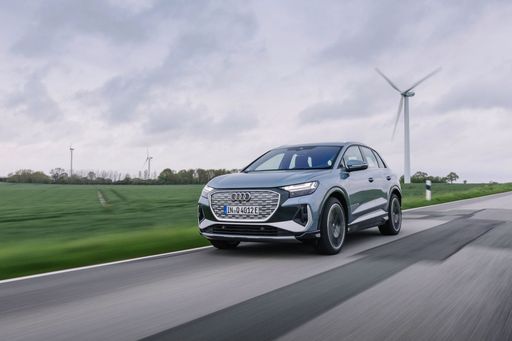 @ audi-mediacenter.com
@ audi-mediacenter.com
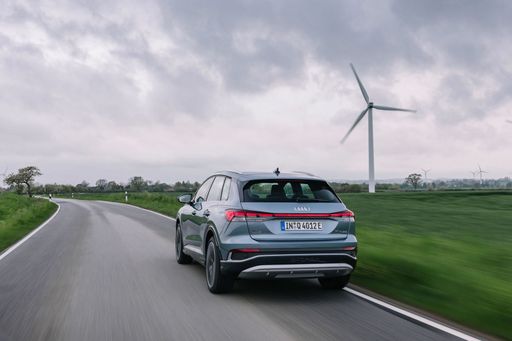 @ audi-mediacenter.com
@ audi-mediacenter.com
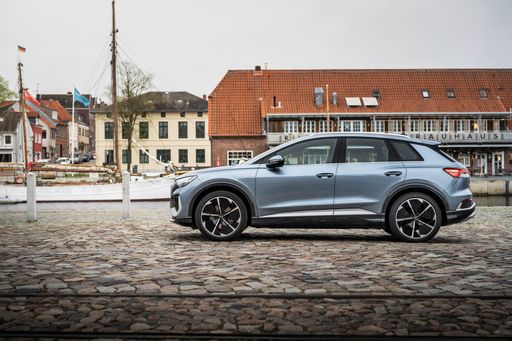 @ audi-mediacenter.com
@ audi-mediacenter.com
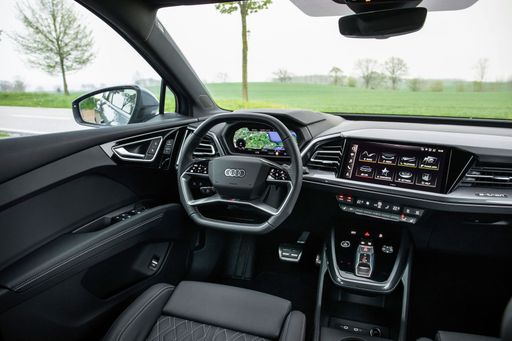 @ audi-mediacenter.com
@ audi-mediacenter.com
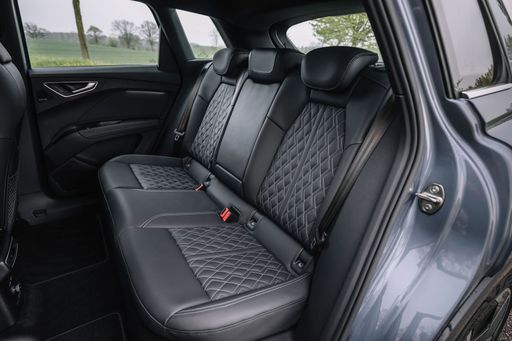 @ audi-mediacenter.com
@ audi-mediacenter.com
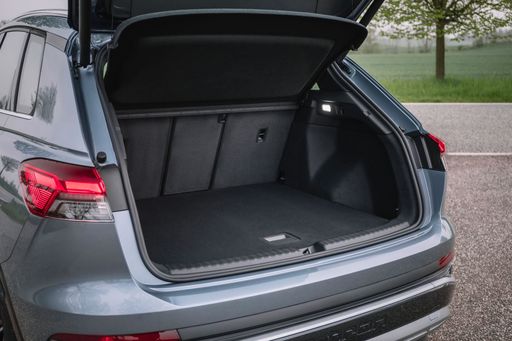 @ audi-mediacenter.com
@ audi-mediacenter.com
 @ hyundai.news
@ hyundai.news
 @ hyundai.news
@ hyundai.news
 @ hyundai.news
@ hyundai.news
 @ hyundai.news
@ hyundai.news
 @ hyundai.news
@ hyundai.news

|

|
|
|
|
成本和油耗 |
|
|---|---|
|
价格
约 45600 - 68600
€
|
价格
约 35000 - 54100
€
|
|
油耗 L/100公里
-
|
油耗 L/100公里
1 - 6.8
L
|
|
能耗 kWh/100公里
15.9 - 17.4
kWh
|
能耗 kWh/100公里
-
|
|
电动续航里程
350 - 554
km
|
电动续航里程
65 - 70
km
|
|
电池容量
52 - 77
kWh
|
电池容量
-
|
|
二氧化碳
0
g/km
|
二氧化碳
22 - 153
g/km
|
|
油箱容量
-
|
油箱容量
42 - 54
L
|
尺寸和车身 |
|
|
车身类型
SUV
|
车身类型
SUV
|
|
座位数
5
|
座位数
5
|
|
车门
5
|
车门
5
|
|
整备质量
1990 - 2235
kg
|
整备质量
1520 - 1889
kg
|
|
行李厢容量
520 - 535
L
|
行李厢容量
546 - 620
L
|
|
长度
4588
mm
|
长度
4510 - 4520
mm
|
|
宽度
1865
mm
|
宽度
1865
mm
|
|
高度
1614 - 1632
mm
|
高度
1650
mm
|
|
载荷
510 - 515
kg
|
载荷
525 - 545
kg
|
发动机和性能 |
|
|
发动机类型
电动
|
发动机类型
柴油轻混合动力, 汽油轻混合动力, 汽油, 全混合动力, 插电式混合动力
|
|
变速器
自动
|
变速器
自动, Manuel
|
|
变速器详情
减速齿轮箱
|
变速器详情
Automat. Schaltgetriebe (Doppelkupplung), 手动变速器, 自动变速器
|
|
驱动类型
后轮驱动, 四轮驱动
|
驱动类型
前轮驱动, 四轮驱动
|
|
功率 (马力)
170 - 340
马力
|
功率 (马力)
136 - 252
马力
|
|
加速 0-100公里/小时
5.4 - 9
s
|
加速 0-100公里/小时
7.9 - 11.6
s
|
|
最高速度
160 - 180
km/h
|
最高速度
180 - 194
km/h
|
|
扭矩
310 - 679
Nm
|
扭矩
265 - 367
Nm
|
|
气缸数量
-
|
气缸数量
4
|
|
功率 (kW)
125 - 250
kW
|
功率 (kW)
100 - 185
kW
|
|
发动机排量
-
|
发动机排量
1598
cm3
|
|
最高速度
160 - 180
km/h
|
最高速度
180 - 194
km/h
|
概况 |
|
|
车型年份
2023 - 2024
|
车型年份
2024
|
|
CO2效率等级
A
|
CO2效率等级
D, E, B
|
|
品牌
Audi
|
品牌
Hyundai
|
Audi Q4 e-tron
Introducing the Audi Q4 e-tron: The Future of Electric Mobility
The Audi Q4 e-tron marks a significant leap forward in the world of electric vehicles, combining luxury, performance, and cutting-edge technology into one dynamic package. As part of Audi's e-tron family, this SUV not only offers a sustainable alternative to traditional fuels but does so with the unmistakable elegance and comfort that the brand is renowned for.
Engine and Performance: Power Meets Efficiency
The Q4 e-tron is available in various configurations, showcasing Audi's commitment to offering choices suited to different driving styles and needs. With power outputs ranging from 170 PS to 340 PS, the Q4 e-tron allows enthusiasts and casual drivers alike to enjoy a spirited driving experience.
One of the standout features of the Q4 e-tron is its efficient energy consumption. Models achieve consumption figures as low as 15.9 kWh/100 km, enabling impressive ranges of up to 554 km on a single charge. This makes the Q4 e-tron not only a competent urban commuter but also a capable vehicle for longer journeys. The acceleration from 0-100 km/h varies between 5.4 and 9 seconds, depending on the configuration, allowing drivers to enjoy a thrilling performance without compromising on efficiency.
Battery Technology: Powering the Future
Equipped with a battery capacity ranging from 52 kWh to 77 kWh, the Audi Q4 e-tron features impressive charging capabilities. The intelligent battery management system optimally uses the stored energy, balancing performance with efficiency. This innovative approach ensures that owners can maximise the electric range without the need for frequent recharges.
Innovative Interior and Technology
Inside the Audi Q4 e-tron, luxurious materials and modern design come together seamlessly. The spacious cabin is designed for five passengers, offering ample legroom and luggage space of 520 to 535 litres, making it practical for everyday use. The digital cockpit, complete with a high-resolution display, provides essential information at a glance, while the intuitive infotainment system seamlessly integrates with smartphones for an enhanced connectivity experience.
Sustainability and Driving Dynamics
Sustainability is at the core of the Audi Q4 e-tron's design. The vehicle not only produces zero emissions but also incorporates recycled materials in its manufacturing processes, showcasing Audi's commitment to eco-friendly production. Furthermore, with optional all-wheel drive capabilities available, the Q4 e-tron ensures excellent traction and stability, regardless of road conditions, making every drive enjoyable and secure.
Conclusion: A Symbol of Electric Elegance
The Audi Q4 e-tron epitomises the brand's drive towards a more sustainable future while maintaining the performance and luxury that customers expect. With its diverse range of configurations, advanced technology, and commitment to efficiency, the Q4 e-tron is not just another electric vehicle—it's a bold statement in automotive innovation. As we move forward, this vehicle is set to become a benchmark in the electric SUV segment, offering an exemplary blend of comfort, performance, and technology.
Hyundai Tucson
Introducing the Hyundai Tucson: An SUV with Innovation at its Core
The Hyundai Tucson has long been synonymous with reliability, comfort, and exceptional value. With its 2024 model, this popular SUV has taken a bold leap forward by incorporating cutting-edge technology, efficient powertrains, and striking design. Let's delve into the technical details and innovations that make the Hyundai Tucson a standout in the crowded SUV market.
Dynamic Engine Options: Power Meets Efficiency
The Tucson offers a range of powertrains, ensuring there is a model perfect for every driver. Whether you're looking for the fuel efficiency of a mild-hybrid diesel or the power of a plug-in hybrid, the Tucson has you covered. The engine options include:
- Diesel Mild-Hybrid: Combining efficiency with robust performance.
- Benzin Mild-Hybrid: Offering a balance between economy and power.
- Voll-Hybrid: Delivering impressive power while maintaining low fuel consumption.
- Plug-in Hybrid: Offering electric-only driving capabilities with a range of up to 65 km.
These engines are paired with either a manual or automatic transmission, catering to different driving preferences.
Performance and Handling: Experience the Drive
The performance of the Hyundai Tucson is designed to impress, with power outputs ranging from 136 to 252 PS. The Tucson accelerates from 0-100 km/h in as little as 8.1 seconds, managed by precise transmission options such as the dual-clutch and traditional automatic gearboxes. With both front-wheel and all-wheel drive options, the Tucson assures stability and control in varied driving conditions.
Interior and Technology: Comfort Meets Cutting-Edge Innovation
The Tucson's interior is a haven of comfort and technology. With a length ranging up to 4520 mm and a spacious boot capacity of 620 litres, practicality is at the forefront. The intuitive infotainment system includes advanced connectivity features, while driver-assist technologies enhance safety and convenience on every journey.
The choice of luxurious trims and finishes, combined with ergonomic design, ensures that every drive is a pleasure, whether you're on a daily commute or an extended adventure.
Environmental Considerations: Efficiency and Sustainability
Hyundai has made notable strides in ensuring that the Tucson is as environmentally friendly as possible. Models with CO2 emissions as low as 27 g/km place it amongst the leaders in its class for eco-friendly driving. The array of hybrid options further complements Hyundai's commitment to sustainability, providing consumers with green alternatives without compromising performance.
Conclusion: The Hyundai Tucson Is More Than Just an SUV
The 2024 Hyundai Tucson is more than just a means of transport—it's a statement of modernity. It reflects Hyundai's dedication to innovation, efficiency, and comfort, all wrapped up in a stylish and versatile SUV. Whether you're tech-savvy, eco-conscious, or performance-oriented, the Tucson proves to be an ideal choice for forward-thinking drivers.
